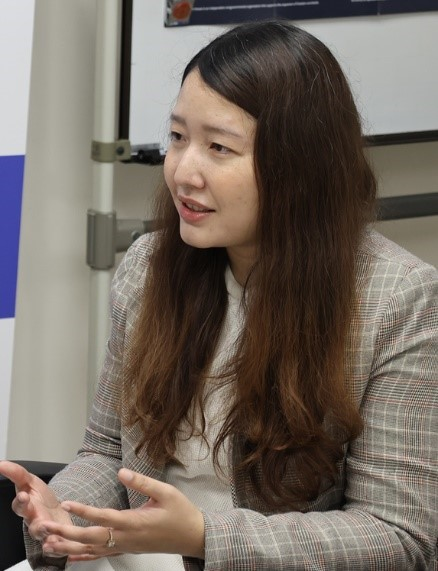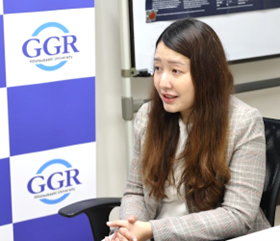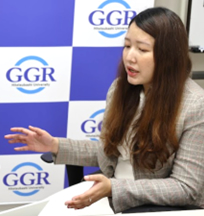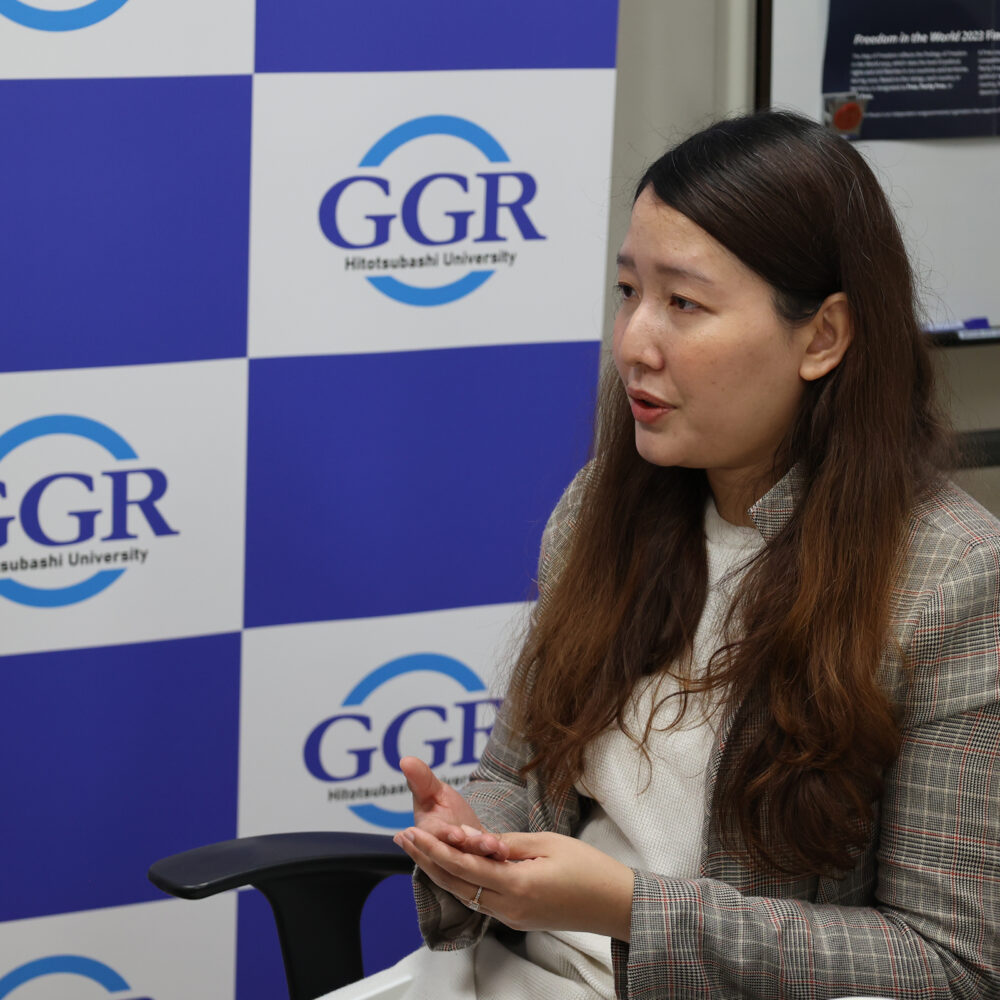Being Connected from Myanmar: “We Are Still Here”
Interviewer and writer: Sulastri
(Master’s student, School of International and Public Policy, Hitotsubashi University)
April 30, 2024
*This paper was written based on an interview conducted on March 8, 2024.
 Hnin Htet Htet Aung arrived in Japan in 2021, fleeing the aftermath of the coup in Myanmar. The memories of those turbulent times are embedded vividly in her mind. The situation during the coup was dire, with the military imposing strict controls, including severe limitations on internet access and power outages. Raids on homes and arbitrary arrests of journalists, activists, and politicians were commonplace and happened during the black-out period. Access to electricity and the internet was restricted to a mere four hours each morning, from 8:00 to 12:00. This restricted time made it extremely difficult to stay informed on the country’s situation or to reach out to loved ones.
Hnin Htet Htet Aung arrived in Japan in 2021, fleeing the aftermath of the coup in Myanmar. The memories of those turbulent times are embedded vividly in her mind. The situation during the coup was dire, with the military imposing strict controls, including severe limitations on internet access and power outages. Raids on homes and arbitrary arrests of journalists, activists, and politicians were commonplace and happened during the black-out period. Access to electricity and the internet was restricted to a mere four hours each morning, from 8:00 to 12:00. This restricted time made it extremely difficult to stay informed on the country’s situation or to reach out to loved ones.
Hnin Htet Htet Aung has experienced three distinct periods of governance during her lifetime. The year 2010 marked the beginning of a transition period, but it was in 2015, with the National League for Democracy (NLD) assuming power and securing seats in the parliament, that significant changes occurred. This transition not only altered the ruling party but also ushered in a period of increased civic engagement and openness. “Before the coup, I held a deep faith in my country,” she reflects. “I was actively involved in Myanmar Extractive Transparency Initiatives (MEITI) activities, while Myanmar was one of the member countries. However, following the coup, our membership was suspended by the headquarters in Oslo. After EITI delisted Myanmar in 2024, the initiative now counts 55 members.”
The coup brought large changes to Hnin Htet Htet Aung’s own life. “Fleeing to Japan due to the situation in Myanmar left me feeling frustrated with guilt as a survivor. My parents had no choice but to let their child go abroad because in Myanmar you can be arrested and detained any time. It is not limited to males. They arrested regardless of gender. Even now I feel a survivor guilt. Still, I am trying to do my best by participating in fundraising events and protests.”
Reflecting on Mynamar’s history, military control over the government is not a new thing in the political landscape. “Myanmar people have witnessed three coups before, and now this is the fourth time.” She sees the current crisis as having a strong connection to the military’s long history of using violence against its own people. “The military is oppressing people regardless of ethnicity, gender, and religion. They oppress anyone who does not favour and support the military, even people from the same ethnic group.”
 Although there is scepticism regarding the possibility of a united front emerging against the junta, gathering a multiethnic armed resistance and the National Unity Government (NUG), Hnin Htet Htet Aung thinks differently. “We have different priorities and objectives. Gathering these diverse ethnic groups as one force and fighting for democracy and for human rights against the military, they can collaborate with each other. This was seen in Operation 1027, a joint offensive conducted by three ethnic armed organizations.[1] This operation shows how different ethnic groups can unify and fight together against the military.”
Although there is scepticism regarding the possibility of a united front emerging against the junta, gathering a multiethnic armed resistance and the National Unity Government (NUG), Hnin Htet Htet Aung thinks differently. “We have different priorities and objectives. Gathering these diverse ethnic groups as one force and fighting for democracy and for human rights against the military, they can collaborate with each other. This was seen in Operation 1027, a joint offensive conducted by three ethnic armed organizations.[1] This operation shows how different ethnic groups can unify and fight together against the military.”
“For Myanmar,” she added, “it is not just about one person stepping up as leader to promote democracy, to fight for justice and human rights. Surely this is important, but what really makes a difference is the people’s force, for the well-being of the people, because this revolution is led by people. So, this coup is different from the coups in the past.”
Currently the military is attempting to present a facade of harmony with the people by introducing a conscription law, mandating individuals of a specific age to serve a three-year term in the military, creating the image that their rule is legitimate and gaining support from the people. But the problem is, no one wants to go into the military. In response, citizens and the Myanmar diaspora in Japan are mobilizing efforts to petition the Japanese government, urging them to intervene and pressure the military to revoke the conscription law. The situation is difficult, even for the international community. “I want to highlight the humanitarian crisis,” she adds. “The Myanmar people are suffering a lot from this crisis. It has been three years since the military staged the coup. You can see the increasing number of displaced people, and it accelerates more and more. But how about the funding?”
While it is logical to expect an increase in humanitarian aid parallel to the rising numbers of victims, this is not what is happening. Furthermore, the aid provided encounters double challenges – not only does it fall short of reaching the people of Myanmar, but it also inadvertently contributes to supporting the military instead of directly engaging with ethnic revolutionary organizations and pro-democratic forces. Similar to concerns in Afghanistan under Taliban rule, people are worried that ODA might be used by the military, not for the people it is intended to help.
In this situation, it is difficult to rely on other countries. China’s “win-win” policy in Cambodia, helping Prime Minister Hun Sen to consolidate power and stabilize the country, seems to be effective there, but appears questionable for Myanmar, where economic leverage is likely benefiting the military. Western countries have shown limited commitment to resolving the situation. Even during the governance of the NUG, only a handful of countries, such as the US and select European nations, established representative offices in Myanmar.
 “We have no choice but to rely on ourselves. Placing hope in the international community is uncertain,” she says. There are over 50 different Myanmar diaspora organizations in Japan collaboratively addressing Myanmar’s issues. These organizations frequently host fundraising events to provide financial support to the people, lobby parliament to obtain recognition of the NUG, and demand an end to funding for the military. While some still hold hope of international assistance, the main mode of support comes from Myanmar people’s own grassroots efforts to achieve democracy and freedom through collective action.
“We have no choice but to rely on ourselves. Placing hope in the international community is uncertain,” she says. There are over 50 different Myanmar diaspora organizations in Japan collaboratively addressing Myanmar’s issues. These organizations frequently host fundraising events to provide financial support to the people, lobby parliament to obtain recognition of the NUG, and demand an end to funding for the military. While some still hold hope of international assistance, the main mode of support comes from Myanmar people’s own grassroots efforts to achieve democracy and freedom through collective action.
In the Milk Tea Alliance Japan, even though the members are fighting on different fronts, all share one goal: “to fight against dictators.” This alliance serves as a powerful reflection of youth activism and solidarity. Even from afar, Hnin Htet Htet Aung believes, we can give our people a message: “We are with you, we stand with you.”
It will take time to save people and democracy. “Despite the worsening situation and increasing humanitarian suffering,” she says, “I still put some hope in my country so we can achieve democracy.”
[1] Operation 1027 is a joint offensive against the military conducted by the Three Brotherhood Alliance comprising the Arakan Army, the national Myanmar Democratic Alliance Army, and the Ta’ang National Liberation Army, beginning on October 27, 2023.
Hnin Htet Htet Aung is a Master’s student at the School of International and Public Policy at Hitotsubashi University. Previously, she was a visiting researcher at the Graduate School of Law, Hitotsubashi University. Ms. Aung has nine years of experience working in civil society, international non-governmental organizations, and a Singapore-based advisory firm.
Through her work, she has supported civil society organizations and their activists. She has published articles about the political situation in Myanmar, women’s rights, transitional justice, collective actions and freedom of expression, in both Burmese and English. She holds a master’s degree in public administration from Aldersgate College, Philippines, and a bachelor’s degree in law from Dagon University, Myanmar.


